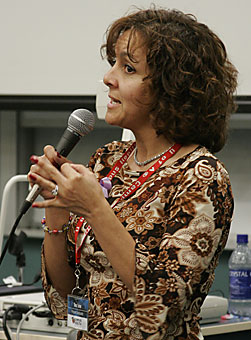 |
|
MATT ROBLES/Arizona Daily Wildcat
|
Tina Tarin, a violence prevention specialist at the OASIS Center for sexual assault on campus, speaks last night during a forum at the Center for English as a Second Language.
|
|
|
By Jennifer Amsler
Arizona Daily Wildcat
Thursday, November 18, 2004
Print this
A forum last night opened up discussion on sexual abuse and domestic violence to increase awareness of a problem that never seems to fade.
Theta Nu Xi, a multicultural woman's sorority, hosted the forum and invited five guests to share their knowledge and advice about creating solutions for an non-violent world.
Mansi Kotwal, the education chair of Theta Nu Xi, said the forum was created to discuss the issues many students know little about.
Tina Tarin, a spokesperson for the OASIS Center, an on-campus service that reaches out to sexual and violence abuse victims, said when she speaks to male students, they assume the woman is consenting based on their assumptions about body language.
Tarin said communication between sexual partners is key because body language alone is not enough to be sure a women is consenting.
"When a person is scared, their heart rate increases, they perspire and they freeze up. These are the same reactions a person has when they're turned on," she said.
The male mentality is programmed by society to think of female victims of sexual assault as "whores," Tarin said.
"We need some strong men on campus to change the way men think. Until we do that, we are just putting a Band-Aid on the problem," she said.
Heather Truschel, a UA graduate who now is a case manager at the Tucson Center for Women and Children Assistance to Victim Abuse of Shelter, spoke at the forum and said the most common question people ask her is, "Why do women stay in abusive relationships?"
Truschel said shame, lack of self-confidence and other psychological factors play a role in why many women don't leave abusive relationships.
One out of every three women will be abused some time in their lives, Truschel said. Abuse is the No. 1 reason women go to the emergency room, she added, which is more often than injuries from car accidents.
Heather Hill, an advocate for Wingspan, an anti-violence project in Tucson for the lesbian, gay, bisexual and transgendered community, said it is important to remember violence is not always as gender-specific as many people think.
"When we talk about domestic violence we always talk about male/female relationships," Hill said. "We can't minimize the fact that it happens in all types of relationships."
Hill said LGBT individuals don't have the same access to help if they are in an abusive relationship because some are not publicly "out" or think seeking help will reflect poorly on the gay community.
Stereotypes are another reason a person in a gay relationship might hesitate to get help, Hill said. She said often times lesbians in abusive relationships will lie and tell counselors their abusers are male.
"It has nothing to do with size and appearance. It has to do with power and control," Hill said.
Seth Lesky, a computer science senior, said mainstream entertainment usually portrays men in a dominant role, contributing to the problem of domestic violence.
"Violence against women is a global problem but is culturally accepted in some countries," he said.
Christine Taylor, a psychology junior, said she volunteered at the OASIS Center and has an interest in preventing domestic violence.
Public knowledge would help the problem worldwide, she said.
"Women have rights they might not be aware of. They can make their situations better," Taylor said.
